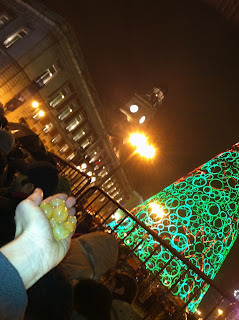July 17, 2010 - Lijiang, Yunnan, China
Xia yu, bu chou
Ren jia you san
Wo you da tou
English Translation:
Big head, big head
When it rains, I'm not sad
Others have umbrellas
I've got a big head
The rain keeps coming and it's getting colder, but social life in China persists. At night I find a sleepy cafe to write, while looking out over the bustling streets below. Brightly-lit red lanterns hang from family-packed restaurant windows placed along the canals - all nightlife appears unphased by the pouring rain. Day and night, thousands of uniquely decorated bright umbrellas dancing along the streets, will forever remind me of Lijiang.
 We've been playing with the idea of conflicts and contradictions in China. Joseph Rock, a famous botanist, found his way to Lijiang in the 1920's. Rock collected and sent over 80,000 plants, 1600 birds, and 60 mammals out of China to be researched in the West. Rock is considered a local hero because he wrote National Geographic articles about Yunnan and Sichuan, placing southwest China on the map for ecological and cultural importance. Or, did he exploit the region by encouraging Europeans to collect Yunnan's exotic plants for their personal gardens?
We've been playing with the idea of conflicts and contradictions in China. Joseph Rock, a famous botanist, found his way to Lijiang in the 1920's. Rock collected and sent over 80,000 plants, 1600 birds, and 60 mammals out of China to be researched in the West. Rock is considered a local hero because he wrote National Geographic articles about Yunnan and Sichuan, placing southwest China on the map for ecological and cultural importance. Or, did he exploit the region by encouraging Europeans to collect Yunnan's exotic plants for their personal gardens? Over the years, I've visited Buddhist temples all over Japan, South Korea, and India, but today was my first Tibetan Buddhist Temple. The colors, artifacts, symbolism - pure sensory overload. The Zhijun (Pointing to the Clouds) Monastery, located near Lashi Hai Lake is home to over 40 monks (mostly from Sichuan Province) who are peacefully devoting their lives to the study and practice of Buddhism. Incense is rarely used in Tibetan Buddhism, instead burn candles set in yak butter. I have become a huge fan of yaks.
Over the years, I've visited Buddhist temples all over Japan, South Korea, and India, but today was my first Tibetan Buddhist Temple. The colors, artifacts, symbolism - pure sensory overload. The Zhijun (Pointing to the Clouds) Monastery, located near Lashi Hai Lake is home to over 40 monks (mostly from Sichuan Province) who are peacefully devoting their lives to the study and practice of Buddhism. Incense is rarely used in Tibetan Buddhism, instead burn candles set in yak butter. I have become a huge fan of yaks.+ Yak cheese
+ Yak yogurt
+ Yak jerky
+ Tibetan Buddhism yak butter candles
Establishing a Non-Governmental Organization (NGO) is tricky in China. However, the Nature Conservancy has collaborated with Yunnan officials to build local conservation, including a biofuel energy program to power village homes using human and livestock waste. At the end of today, we stopped by the projects headquarters to make a contribution.
Establishing a Non-Governmental Organization (NGO) is tricky in China. However, the Nature Conservancy has collaborated with Yunnan officials to build local conservation, including a biofuel energy program to power village homes using human and livestock waste. At the end of today, we stopped by the projects headquarters to make a contribution.



